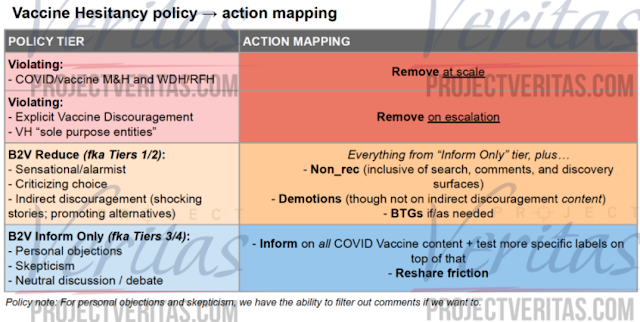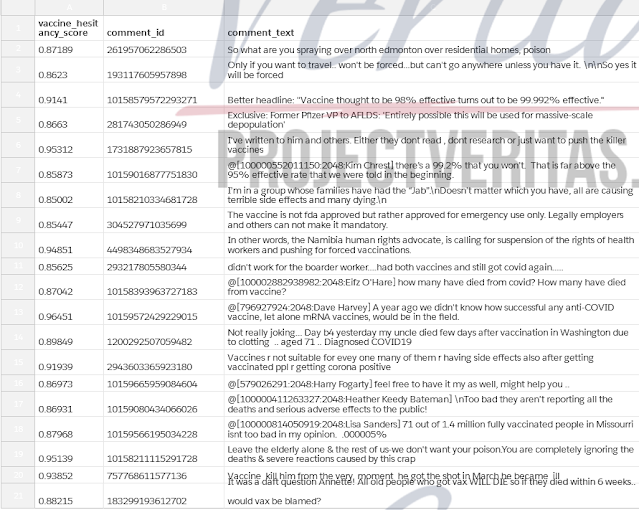If the COVID-19 Vaccines Are Dangerous, How Come the Media Isn't Telling Us? (Pt. 1 of What to Consider Before Getting a COVID-19 "Vaccine" or Semi-Annual Re-Vaxx)
NOTE: Below is part 1 of What to Consider Before Getting a COVID-19 "Vaccine" or Semi-Annual Re-Vaxx that was originally published May 24, 2021. If you haven't read the introduction, you may click the prior-referenced link to read it, which will also include the further parts that will be subsequently added.
#1 If the COVID-19 Vaccines Are Dangerous, How Come the Media Isn't Telling Us?
As of May 21, 2021, despite being a fraction of the billions upon billions of vaccines given since 1990 in the United States, COVID-19 vaccines represented 46.06% of all death (4,265 out of 9,258) and 21.65% (3,284 out of 15,165) of all permanent disability incidents reported since 1990 to the Centers for Disease Control's (CDC) Vaccine Adverse Event Reporting System (VAERS) [*1], a voluntary-reporting tool healthcare workers and individuals may use if they believe a vaccine may have caused an injury or death (meaning not all possible incidents are recorded). U.S. COVID-19-vaccine incidents total 248,947, or 24.8% of all incidents reported since 1990, as of publication of this piece( UPDATE: as of, July 30, 2021, they total 40.9% worldwide on VAERS, with 603,686 incidents). . This percentage rapidly increases as we progress further into 2021 and beyond. You won't read about this most places, but the data can be readily accessed here [*2].
Why don't the vast majority of the media report negative COVID-19 vaccine information? It's important to recognize that you are not the customer. You are the product being delivered to the real customer: advertisers that include pharmaceutical companies with a vested financial interest in being paid for as many vaccine doses as possible.[F]ewer than 1% of vaccine adverse events are reported. … Barriers to reporting include a lack of clinician awareness, uncertainty about when and what to report, as well as the burden of reporting: reporting is not part of the clinician's usual workflow, takes time, and is duplicative.
Robert F. Kennedy, Jr., lawyer and vaccine-safety advocate, describes the dilemma in shocking detail in his foreword to Dr. Joseph Mercola's May 2021-published book, The Truth About COVID-19 [*4]:
Big Pharma’s $9.6 billion annual advertising budget gives these unscrupulous companies control over our news and television outlets. Strong economic drivers (pharmaceutical companies are the biggest network advertisers) have long discouraged mainstream media outlets from criticizing vaccine manufacturers. In 2014, a network president, Roger Ailes, told me he would fire any of his news show hosts who allowed me to talk about vaccine safety on air. "Our news division," he explained, "gets up to 70% of ad revenues from pharma in non-election years [emphasis added]."Regarding social media companies' constant censorship and "fact checking" to ensure their readers (i.e. their human products they sell to advertisers) won't doubt the safety and/or efficacy of COVID-19 vaccines, these companies are funded by advertisers that use the platforms to target specific people, including people that researched information on particular drugs. The Washington Post reported on March 4, 2020 [*5], "Spending on Facebook mobile ads alone by pharmaceutical and health-care brands reached nearly a billion dollars in 2019, nearly tripling over two years, according to Pathmatics, an advertising analytics company [emphasis added]." Advertisers go as far as to bully social media companies for not actively censoring "misinformation" about their products. According to Pfizer, one the biggest COVID-19 vaccine makers, as CBS reported on June 30, 2020 [*6]:
Pfizer said it will be removing all of its advertising from Facebook and Instagram for the month of July. “Today, we are asking Facebook to take proactive steps to ensure their platforms are safe and trusted spaces for all,” the company said.And, Facebook and Instagram at least, not only bent the knee to Big Pharma but lowered both knees and assumed the position for them. In leaked documents from Facebook, released by Project Veritas on May 24, 2021 [*7], we learned Facebook actively removes or demotes comments by users sharing information they refer to as "vaccine hesitancy" via a trial program affecting 1.5% of their 3.8 billion world-wide users. The document reveals 19.42% of comments on pages discussing vaccination are negative or "vaccine hesitancy." Such comments represent 25.3% of those on "Health Authority Pages." Despite these comments being the minority, Facebook states a goal of reducing them further.

Comments that are anti-vaccine are outright removed, depending on their user-reach and level of discouragement, while comments that are true but not actively discouraging taking the vaccine, like personal stories about negative effects or factual information that's negative to the vaccines, are "demoted." This means hidden from other viewers, or, as it's colloquially referred to, "shadow banned."


Pages, groups, or accounts explicitly dedicated to discouraging vaccination are "removed" if they become too visible, while non-explicit vaccine-discouraging accounts simply have their comments related to "vaccine hesitancy" made less visible to the general public.

There's even a scoring system applied to comments for deciding what action the censorship algorithms will take.

We're all familiar with the labels social media puts on posts users share on any topic even tangentially related to COVID-19 vaccines, reminding us of how safe and effective they are alleged to be. We're also familiar with the "fact checks" they add to any negative vaccine information, to reassure us there is either another side of the argument or the article shared is "false," "mostly false," or (my favorite) "missing context."
The social-media pleas they self-refer to as "fact checks" on COVID-19 vaccines are to ensure their customers (pharmaceutical companies) advertise on their platforms. But they are laughably inept. Even the "fact checks" from the general more-reputable media are feckless. Take this Reuters "fact check" on whether the vaccines prevent human-to-human-transmission of COVID-19 [*9]. Reuters admits the vaccines were never tested on human-to-human transmission (which, one would think, disqualify said pharmaceutical products from the label "vaccine") [*9] but argues that, because there is no evidence the labeled vaccines don't prevent human-to-human transmission, claims saying they don't are false.
There is no proof snake oil triples the size of the male penis, but, because there is no proof snake oil doesn't do this, doubting the veracity of the claim is false! See how this works? The aforementioned Reuters "fact check" is so feckless and wickedly dishonest, I screenshot it below, as it dispels belief when merely quoted.


The heuristic regarding the efficacy of substituting the word of authorities for foundational knowledge is usually a sound shortcut to navigate life decisions, since we can't critically examine everything we claim to "know" [*10]. We rely on news reports, papers, and books we commonly refer to as "authorities" to inform us as a proxy. We don't have the time or knowledge-base, let alone legal authority, to create pharmaceutical products in our basements, run experiments at home, and find 100,000 test subjects to track efficacy and safety of our creations. So, we trust the conclusions of authorities that have done similar things for us, who could easily get their data, let alone their conclusions from that data, wrong. How wrong? The UC San Diego News Letter reports [*11]:
[A May 21, 2021-published study *12] analyzed data from three influential replication projects which tried to systematically replicate the findings in top psychology, economic and general science journals (Nature and Science). In psychology, only 39 percent of the 100 experiments successfully replicated. In economics, 61 percent of the 18 studies replicated as did 62 percent of the 21 studies published in Nature/Science.If the raw data the conclusions we call "science" are that inaccurate, imagine how much worse the sophistry of pharmaceutical-funded media and social media companies who relay this kind of information is?
Continued in Part 2: False Efficacy: the Difference Between Absolute and Relative Risk
All subsequent and prior parts to the full piece, as they are published, can be read here.
---
FOOTNOTES
[*1] https://stratagemsoftheright.blogspot.com/2021/05/covid-19-not-vaccines-represent-41-of.html
[*2] https://wonder.cdc.gov/vaers.html
[*3] https://digital.ahrq.gov/sites/default/files/docs/publication/r18hs017045-lazarus-final-report-2011.pdf
[*4] Mercola, Joseph; Cummins, Ronnie. The Truth About COVID-19 (p. xiv). Chelsea Green Publishing. Kindle Edition. https://www.amazon.com/Truth-About-COVID-19-Lockdowns-Passports-ebook/dp/B08WRDXLVY
[*5] https://www.washingtonpost.com/technology/2020/03/03/facebook-pharma-ads/
[*6] https://www.cnbc.com/2020/06/30/chobani-pfizer-and-sap-join-list-of-companies-pulling-faebook-ad-spend.html
[*7] https://www.projectveritas.com/news/breaking-facebook-whistleblowers-expose-leaked-internal-docs-detailing-new/
[*8] https://www.reuters.com/article/uk-factcheck-transmission-idUSKBN29N1UH
[*9] https://stratagemsoftheright.blogspot.com/2021/04/to-get-or-not-get-not-vaccine-anatomy.html
[*10] https://stratagemsoftheright.blogspot.com/2021/02/evidence-in-long-shadow-of-civilization.html
[*11] https://archive.is/xLGE5#selection-181.208-181.247
[*12] https://advances.sciencemag.org/content/7/21/eabd1705
Science Advances 21 May 2021: Vol. 7, no. 21, eabd1705 DOI: 10.1126/sciadv.abd1705










Comments
Post a Comment